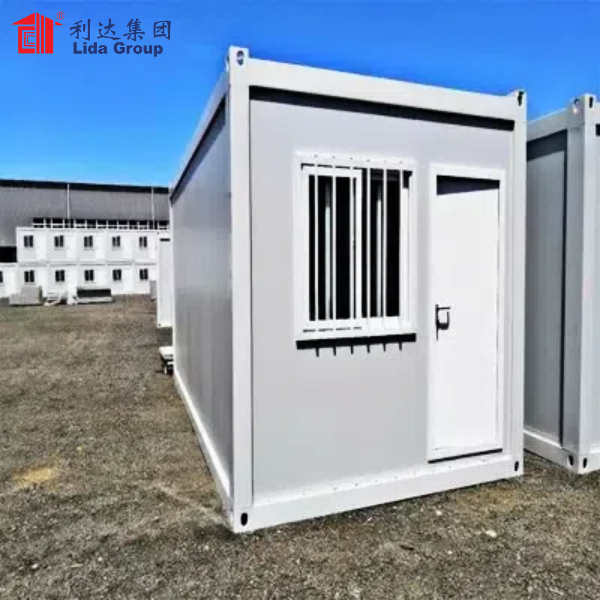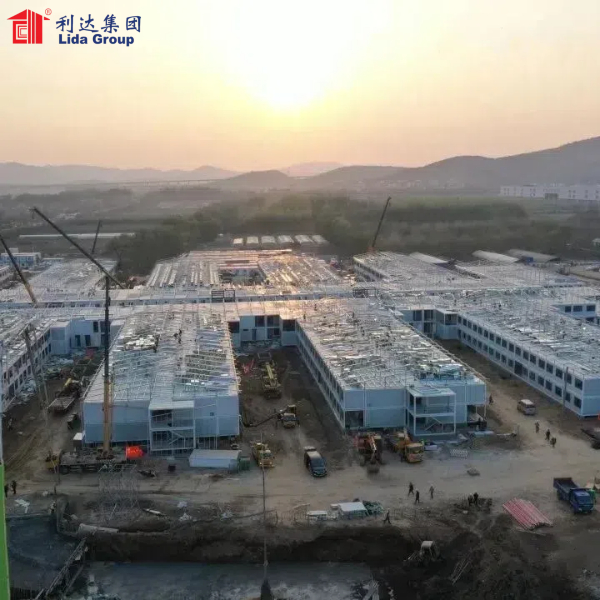In an era where industries are expanding and labor forces are becoming increasingly mobile, the need for resilient, efficient, and comfortable housing solutions for workers has never been more critical. Lida Group has emerged as a leader in the field of prefabricated construction, particularly with its innovative container houses designed specifically for labor camps. This article explores the advantages of Lida Group’s container houses, their design features, and the broader implications for workforce housing.
The Importance of Labor Camps
Understanding Labor Camps
Labor camps provide temporary housing for workers engaged in industries such as construction, mining, and agriculture, often in remote locations. These camps are essential for ensuring that workers have safe and comfortable living conditions during their assignments. As the demand for skilled labor grows, the design and implementation of labor camps must evolve to meet the needs of a modern workforce.
Challenges in Traditional Housing Solutions
Traditional housing solutions for labor camps often face significant challenges:
- High Construction Costs: Conventional building methods can be expensive and time-consuming, leading to delays in providing adequate housing.
- Inadequate Living Conditions: Many traditional labor camps offer insufficient amenities and comfort, negatively impacting worker morale and productivity.
- Environmental Impact: Conventional construction methods can result in considerable waste and a larger carbon footprint.
- Flexibility Issues: Traditional buildings are often permanent, making it difficult to adapt to changing workforce needs.
Lida Group: A Leader in Innovative Housing Solutions
Company Background
Founded in [Year], Lida Group has established itself as a pioneer in the prefabricated housing market. The company specializes in designing and manufacturing modular and container houses that cater to various industries, including labor camps. Lida Group’s commitment to quality, efficiency, and sustainability has made it a trusted partner for companies seeking effective housing solutions.
Mission and Vision
Lida Group’s mission is to provide high-quality, customizable housing solutions that enhance the living conditions of workers. The company envisions a future where affordable and sustainable housing is accessible to all, contributing to worker satisfaction and productivity.
The Rise of Container Houses
What Are Container Houses?
Container houses are structures made from repurposed shipping containers that have been modified for residential use. These houses can be quickly assembled and customized to meet specific needs, making them an ideal solution for labor camps.
Advantages of Container Houses
- Cost-Effectiveness: Container houses are often more affordable than traditional construction methods due to their modular design and efficient manufacturing processes.
- Speed of Construction: The quick assembly of container houses allows for rapid deployment, addressing urgent housing needs in a timely manner.
- Durability: Shipping containers are designed to withstand harsh environmental conditions, making them a resilient option for labor camps.
- Flexibility and Customization: Container houses can be easily modified and expanded to accommodate varying workforce sizes and needs.
- Sustainability: Utilizing repurposed shipping containers reduces waste and promotes recycling, aligning with sustainable building practices.
Lida Group’s Container Houses: Key Features
Modular Design
Lida Group’s container houses are designed with modularity in mind. This means that individual units can be combined or stacked to create larger living spaces. The modular approach allows for flexibility in layout, enabling companies to adapt their housing solutions to specific project requirements.
Customizable Layouts
One of the standout features of Lida Group’s container houses is their customizable layouts. Companies can choose from various floor plans and configurations to accommodate different numbers of workers. Options include single-occupancy rooms, multi-occupancy dormitories, and communal living spaces, all designed to enhance comfort and functionality.
Integrated Amenities
Lida Group prioritizes the needs of workers by incorporating essential amenities into its container houses. These can include:
- Bathrooms: Private or shared bathrooms to ensure hygiene and comfort.
- Kitchens: Fully equipped kitchens or communal cooking areas to facilitate meal preparation.
- Common Areas: Spaces for relaxation and social interaction, which are vital for building camaraderie among workers.
Energy Efficiency
Lida Group’s container houses are designed with energy efficiency in mind. Features such as high-quality insulation, energy-efficient windows, and the option for renewable energy sources (e.g., solar panels) help to minimize energy consumption and reduce utility costs.
Safety and Security
Safety is a top priority in labor camp design. Lida Group’s container houses are constructed with robust materials that provide structural integrity against environmental challenges. Additionally, secure locking mechanisms and optional security features ensure the safety of occupants.
Enhancing Worker Well-Being
Comfortable Living Conditions
Lida Group understands that comfortable living conditions are essential for worker well-being. Container houses provide a warm, inviting environment that helps to improve morale and overall job satisfaction. Key aspects include:
- Quality of Materials: The use of durable materials ensures long-lasting structures that can withstand the rigors of daily life in a labor camp.
- Personal Space: Individual and shared units are designed to offer personal space, which is crucial for mental health and relaxation.
- Community Building: Communal areas facilitate social interaction, allowing workers to connect and build relationships, which can enhance team cohesion.
Psychological Benefits
Research indicates that comfortable living conditions positively impact mental health and productivity. By investing in high-quality container housing, companies can enhance worker satisfaction, reduce turnover rates, and ultimately boost productivity.
Sustainability and Environmental Responsibility
Commitment to Sustainable Practices
Lida Group is dedicated to promoting sustainability in its construction practices. Container houses align with eco-friendly building principles by:
- Repurposing Materials: By utilizing shipping containers, Lida Group reduces the need for new materials, minimizing waste and environmental impact.
- Energy Efficiency: The design of container houses often includes energy-efficient features, which help reduce carbon emissions and lower utility costs.
- Reduced Construction Waste: The modular construction process allows for better control over materials, resulting in less waste compared to traditional building methods.
Long-Term Environmental Benefits
Investing in sustainable container housing not only benefits the environment but also yields long-term savings. Reduced energy and maintenance costs contribute to the overall financial viability of labor camps while promoting corporate social responsibility.
Case Studies: Successful Implementation of Lida Group’s Container Houses
Mining Operations
In a remote mining operation, a company faced significant challenges in providing adequate housing for its workforce. Traditional construction methods were impractical due to logistical issues and harsh environmental conditions. Lida Group was engaged to provide container housing solutions.
The rapid deployment of modular units allowed the mining company to establish comfortable living quarters for its workers. The prefabricated design ensured durability, and the inclusion of communal spaces improved worker morale and productivity.
Construction Projects
A large construction firm undertaking a major infrastructure project needed to provide housing for its workers quickly. By utilizing Lida Group’s container houses, the firm was able to set up a labor camp within weeks, significantly enhancing the living conditions for its workforce.
The customizable options allowed for the integration of kitchens and recreational spaces, leading to higher worker satisfaction and improved productivity on-site.
Agricultural Labor Camps
In the agricultural sector, a cooperative sought to provide temporary housing for seasonal workers. Lida Group’s container houses were deployed, allowing the cooperative to quickly establish housing that could be easily expanded or relocated as needed. The positive impact on worker satisfaction translated into higher productivity during peak harvest times.
Challenges and Considerations
Initial Investment
While container housing offers long-term savings, the initial investment may be a barrier for some companies. However, it is essential to consider the total cost of ownership, including maintenance and energy savings, which often makes prefab housing a financially sound choice.
Regulatory Compliance
Navigating local building codes and regulations can pose challenges when implementing container housing solutions. Lida Group works closely with local authorities to ensure that all units meet necessary compliance standards, facilitating a smoother deployment process.
Cultural Sensitivity
In regions with diverse cultural backgrounds, it is crucial to consider the needs and preferences of the workforce when designing housing solutions. Lida Group’s flexible designs allow for adaptations that respect local customs and practices, ensuring that living spaces are suitable for all workers.
The Future of Container Housing Solutions
As the demand for efficient and sustainable housing solutions continues to grow, Lida Group is well-positioned to lead the charge in the container housing market. Innovations in construction technology and materials will further enhance the appeal of these units, making them even more efficient and adaptable.
Technological Innovations
The integration of smart technology into container housing is an emerging trend. Features such as intelligent climate control, energy management systems, and advanced security measures can improve the living experience for workers while promoting sustainability.
Global Demand
As companies worldwide seek to improve living conditions for transient workers, the global demand for container housing solutions is expected to rise. Lida Group’s commitment to designing comfortable, functional, and sustainable housing will make it a preferred partner for organizations looking to enhance their labor camps.
Conclusion
Lida Group’s container houses represent a groundbreaking approach to labor camp design, addressing the unique challenges of workforce housing with innovative, sustainable solutions. By prioritizing comfort, efficiency, and environmental responsibility, Lida Group has established itself as a leader in the prefab housing market. As industries continue to evolve, the advantages of container housing will become increasingly evident, paving the way for a future where affordable and comfortable living is accessible to all workers. Embracing these innovative housing solutions is not just a strategic business decision; it is a commitment to enhancing the quality of life for workers and contributing to a more sustainable future in labor management.
Contact Us
Post time: Dec-18-2024


